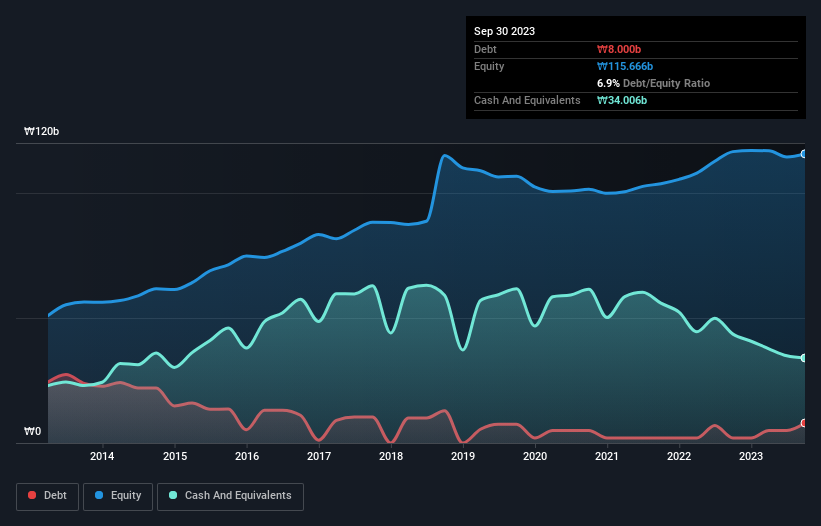- South Korea
- /
- Electronic Equipment and Components
- /
- KOSDAQ:A036010
Does ABCO Electronics (KOSDAQ:036010) Have A Healthy Balance Sheet?
Warren Buffett famously said, 'Volatility is far from synonymous with risk.' So it might be obvious that you need to consider debt, when you think about how risky any given stock is, because too much debt can sink a company. We note that ABCO Electronics Co., Ltd. (KOSDAQ:036010) does have debt on its balance sheet. But the real question is whether this debt is making the company risky.
Why Does Debt Bring Risk?
Generally speaking, debt only becomes a real problem when a company can't easily pay it off, either by raising capital or with its own cash flow. In the worst case scenario, a company can go bankrupt if it cannot pay its creditors. However, a more common (but still painful) scenario is that it has to raise new equity capital at a low price, thus permanently diluting shareholders. By replacing dilution, though, debt can be an extremely good tool for businesses that need capital to invest in growth at high rates of return. The first thing to do when considering how much debt a business uses is to look at its cash and debt together.
View our latest analysis for ABCO Electronics
What Is ABCO Electronics's Debt?
You can click the graphic below for the historical numbers, but it shows that as of September 2023 ABCO Electronics had ₩8.00b of debt, an increase on ₩2.00b, over one year. But on the other hand it also has ₩34.0b in cash, leading to a ₩26.0b net cash position.

How Healthy Is ABCO Electronics' Balance Sheet?
Zooming in on the latest balance sheet data, we can see that ABCO Electronics had liabilities of ₩21.5b due within 12 months and liabilities of ₩8.07b due beyond that. Offsetting this, it had ₩34.0b in cash and ₩19.7b in receivables that were due within 12 months. So it actually has ₩24.2b more liquid assets than total liabilities.
This surplus suggests that ABCO Electronics is using debt in a way that is appears to be both safe and conservative. Given it has easily adequate short term liquidity, we don't think it will have any issues with its lenders. Simply put, the fact that ABCO Electronics has more cash than debt is arguably a good indication that it can manage its debt safely. The balance sheet is clearly the area to focus on when you are analysing debt. But it is future earnings, more than anything, that will determine ABCO Electronics's ability to maintain a healthy balance sheet going forward. So if you're focused on the future you can check out this free report showing analyst profit forecasts.
In the last year ABCO Electronics had a loss before interest and tax, and actually shrunk its revenue by 21%, to ₩133b. That makes us nervous, to say the least.
So How Risky Is ABCO Electronics?
Statistically speaking companies that lose money are riskier than those that make money. And we do note that ABCO Electronics had an earnings before interest and tax (EBIT) loss, over the last year. Indeed, in that time it burnt through ₩14b of cash and made a loss of ₩1.6b. With only ₩26.0b on the balance sheet, it would appear that its going to need to raise capital again soon. Overall, its balance sheet doesn't seem overly risky, at the moment, but we're always cautious until we see the positive free cash flow. For riskier companies like ABCO Electronics I always like to keep an eye on the long term profit and revenue trends. Fortunately, you can click to see our interactive graph of its profit, revenue, and operating cashflow.
When all is said and done, sometimes its easier to focus on companies that don't even need debt. Readers can access a list of growth stocks with zero net debt 100% free, right now.
New: Manage All Your Stock Portfolios in One Place
We've created the ultimate portfolio companion for stock investors, and it's free.
• Connect an unlimited number of Portfolios and see your total in one currency
• Be alerted to new Warning Signs or Risks via email or mobile
• Track the Fair Value of your stocks
Have feedback on this article? Concerned about the content? Get in touch with us directly. Alternatively, email editorial-team (at) simplywallst.com.
This article by Simply Wall St is general in nature. We provide commentary based on historical data and analyst forecasts only using an unbiased methodology and our articles are not intended to be financial advice. It does not constitute a recommendation to buy or sell any stock, and does not take account of your objectives, or your financial situation. We aim to bring you long-term focused analysis driven by fundamental data. Note that our analysis may not factor in the latest price-sensitive company announcements or qualitative material. Simply Wall St has no position in any stocks mentioned.
About KOSDAQ:A036010
ABCO Electronics
Manufactures and sells passive electronic components in South Korea and internationally.
Excellent balance sheet with questionable track record.
Market Insights
Weekly Picks


Crazy Undervalued 42 Baggers Silver Play (Active & Running Mine)


Fiducian: Compliance Clouds or Value Opportunity?

Willamette Valley Vineyards (WVVI): Not-So-Great Value
Recently Updated Narratives

Moderation and Stabilisation: HOLD: Fair Price based on a 4-year Cycle is $12.08


Positioned globally, partnered locally


When will fraudsters be investigated in depth. Fraud was ongoing in France too.
Popular Narratives


MicroVision will explode future revenue by 380.37% with a vision towards success


NVDA: Expanding AI Demand Will Drive Major Data Center Investments Through 2026





